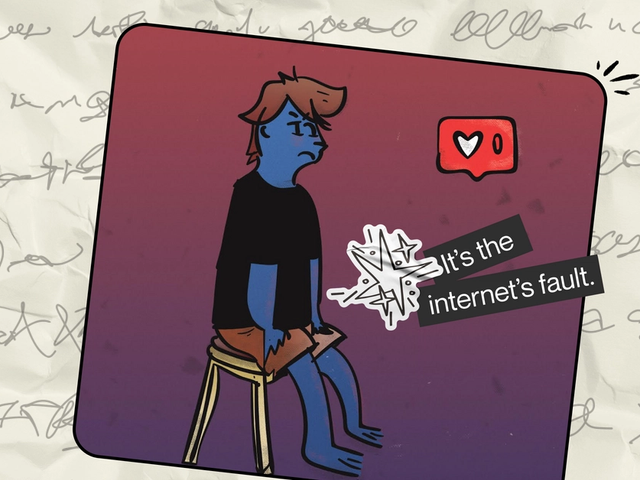
Imperfect Studios is a non-profit organization on a mission to rebrand mental health and pave the way toward a more inclusive digital future. And that makes them the perfect partner for our third article in our series on how the internet has changed just about everything and our mental health is no exception. This article is the first one in a mini-series by Imperfect Studios written to further normalize imperfection and acceptance.
—
The team at imperfect studios currently consists of millennials ranging from (to use the video recording technology timescale) pre-streaming “DVD-natives” 📀 to old school “VHS-natives”. Although we were each introduced to Instagram at different phases of life, we have all observed the unrealistic suggestions of what constitutes health and fitness that flow eternally from the app. Through the help of influencers and the companies that sponsor them, the concept of the ideal lifestyle has been lifted to unprecedented and unachievable heights—a curated, edited snapshot of life (think IRL photoshop). The conversation around social media’s impact on society, popularized by films such as The Social Dilemma, is now such an essential part of the zeitgeist that it is almost trivial to point out the harms of these platforms. We’ve partnered with oxio to bring you this blog series where we go beyond the well-known “Instagram makes teenagers anorexic” meme (not to minimize this issue but rather to broaden it) and explore what else we know about web2’s effects on our brains, minds, and identities.
The negative impacts of social media on our collective mental health has long been known, and in the past few years the conversation has gained new momentum. The widely watched documentary The Social Dilemma (2020) and internal Facebook documents gathered by whistleblower Frances Haugen have shed new light on a concern that has been growing since the birth of the medium. The Social Dilemma revealed, through the testimonies of ex-employees of companies like Google, Twitter, Instagram, and Facebook, the extent to which the manipulation of human behavior is intentionally built into the platforms’ algorithms (Girish, 2020). But it wasn’t until Haugen shared internal company documents with the world that we, the social media users, became truly aware of just how calculated Facebook’s manipulation is.
The documents, first published in the Washington Posts the Facebook Files, reveal that top executives, including Mark Zuckerberg, know exactly the harm that is being committed against the platform’s users, especially young girls, and chose to ignore it. And if this is the story with Facebook, it’s plausible that the situation is similar with other social media companies with similar business models.
The WSJ investigation revealed that top executives were well aware of the negative effects of the platform and did nothing to eliminate them (Horwitz, 2021). Perhaps the most widely-cited negative impact of Facebook is its harmful effect on teenage girls. Internal research documents within Instagram, which is owned by Facebook, show that the platform has a strong negative effect on teenage girls’ mental health, particularly as it relates to body-image issues (Wells et al., 2021). According to internal research, Instagram can make “body image issues worse for one in three teen girls” (Wells et al., 2021). This has been attributed to the fact that the Instagram app focuses more on the full body and lifestyle compared to other apps, like TikTok, which focuses on performance (Wells et al., 2021).
Zooming out, there is a growing body of research on excessive social network site (SNS) use and its correlation with poor mental health in general and increased risks of a variety of more specific negative outcomes across diagnostic categories (meta-analysis by Huang, 2017). Adding to the above research on eating disorders, several other meta-analyses (including Huang, 2017 & Yoon et al., 2019) show that the amount of time spent and the frequency of checking SNS are positively correlated with the severity of depressive symptoms. High SNS use is observed to be correlated with anxiety and “psychological distress” more generally (Keles et al., 2020), intensity of use and dependence on alcohol (Frost & Rickwood, 2017; Curtis et al., 2018), overall well-being (Schmuck et al., 2019), and social anxiety/loneliness (Darcin, 2016).
It is interesting to consider the classic chicken-egg question as it relates to the correlation between SNS use and mental health. Does excessive SNS use lead to depression, or are depressed people more vulnerable to engaging in this behavior? It seems likely that both causal paths operate concurrently in a mutually reinforcing feedback loop, but in small doses, more positive feedback loops may be possible. For example, Nesi (2020) surveyed adolescents, and found that 81% reported feeling “more connected to their friends, and cited other benefits of moderate social engagement online such as identity exploration and creative expression” (Nesi, 2020). These sorts of outcomes would predict more robust mental health, since social connection and self-acceptance are known to increase resilience to both physical and mental stressors (Ozbay et al., 2007).
While the Facebook Files confirm longstanding suspicions and well-documented research surrounding the link between mental health issues and social media use, it is important to consider whether the negative outcomes are due to the technology itself or the ways in which the technology is used. Findings reveal how the so-called “flaws” of the platform are not flaws at all but rather an inherent feature in the product design. By incorporating research from behavioral psychology into their platforms (for more information, read Hooked by Nir Eyal), these companies all but guarantee that their content is addictive. In fact, studies actually show that compulsive social media use and substance addiction light up similar neurological responses in the brain (Canadian Mental Health Association, 2016). It is well-understood that the most reliable predictor of a post’s engagement level is the emotional intensity that it evokes. Due to the amorality of social media algorithms, the nature of the emotional experience is irrelevant to how widely a post is promoted. This means, for example, that posts inspiring feelings of love and hate are equally “valued” in terms of their promotion on Meta’s platforms. While results vary depending on the specific content, the intensity and nature of emotional reactions can lead to more or less desirable real-world outcomes (Schöne, 2021). Since negative content spreads more quickly than positive content, these firms quite literally profit off of making us feel imperfect.
Yes, the research supports the correlation between social media and negative mental health outcomes. But you probably didn’t need the research, did you? We all know that with enough doom scrolling, each of us will eventually stumble upon a post that makes us feel some kind of way 😓. We are all social creatures, and in the internet age, most likely all SNS users. Technology is just a medium – a means to an end, and the fundamental end of SNS is to facilitate multimedia communication between its users across time and space. A “good” social networking platform (one users will engage with) should by definition elicit an emotional response (RIP Google+). However, instead of focusing on metrics (session length, engagement, etc…) that we know lead to negative outcomes, we should focus on the positives, and devote resources to building platforms and features optimized for these positive outcomes.
Sign up to the oxio newsletter to stay up to date on upcoming articles in this series exploring the relationship between technology and mental health. We will explore topics like fake news, toxic masculinity, algorithmic bias, and the future of mental health in web3. Visit the imperfect studios website to learn more about their organization or get involved.
Imperfect Studios (and of course all of us at oxio) would like to give a shout out to: Jonathan Glickman (PhD), Editor. Thea Koper, Author. @boiparanoid, Artist, "No Like No Life." Oh and Nicholas Lighter, Imperfect Studio’s Founder and Creative Director and a pretty chillin’ guy. Thanks y’all!
Sources
Curtis, B. L., Lookatch, S. J., Ramo, D. E., McKay, J. R., Feinn, R. S., & Kranzler, H. R. (2018). Meta‐analysis of the association of alcohol‐related social media use with alcohol consumption and alcohol‐related problems in adolescents and young adults. Alcoholism: Clinical and Experimental Research, 42(6), 978-986.
Enez Darcin, A., Kose, S., Noyan, C. O., Nurmedov, S., Yılmaz, O., & Dilbaz, N. (2016). Smartphone addiction and its relationship with social anxiety and loneliness. Behaviour & Information Technology, 35(7), 520-525.
Eyal, N. (2014). Hooked: How to build habit-forming products. Penguin.
Faelens, L., Hoorelbeke, K., Cambier, R., van Put, J., Van de Putte, E., De Raedt, R., & Koster, E. H. (2021). The relationship between Instagram use and indicators of mental health: A systematic review. Computers in Human Behavior Reports, 4, 100121.
Frost, R. L., & Rickwood, D. J. (2017). A systematic review of the mental health outcomes associated with Facebook use. Computers in Human Behavior, 76, 576-600.
Girish, D. (2020). "The social dilemma” review: unplug and run. The New York Times, 9.
Horwitz, J. (2021). Who is Facebook whistleblower Frances Haugen? What to know after her Senate testimony; A look at the former Facebook employee who gathered documents that formed the foundation of the Journal’s Facebook Files series. The Wall Street Journal.
Huang, C. (2017). Time spent on social network sites and psychological well-being: A meta-analysis. Cyberpsychology, Behavior, and Social Networking, 20(6), 346-354.
Keles, B., McCrae, N., & Grealish, A. (2020). A systematic review: the influence of social media on depression, anxiety and psychological distress in adolescents. International Journal of Adolescence and Youth, 25(1), 79-93.
Nesi, J. (2020). The impact of social media on youth mental health: Challenges and opportunities. NCMJ, 81, 2, pp. 116-121.
Ozbay, F., Johnson, D. C., Dimoulas, E., Morgan III, C. A., Charney, D., & Southwick, S. (2007). Social support and resilience to stress: from neurobiology to clinical practice. Psychiatry (Edgmont), 4(5), 35.
Schmuck, D., Karsay, K., Matthes, J., & Stevic, A. (2019). “Looking Up and Feeling Down”. The influence of mobile social networking site use on upward social comparison, self-esteem, and well-being of adult smartphone users. Telematics and informatics, 42, 101240.
Schöne, J. P., Parkinson, B., & Goldenberg, A. (2021). Negativity spreads more than positivity on Twitter after both positive and negative political situations. Affective Science, 2(4), 379-390.
Social Media and Mental Health Series: Part 1 (2013).. Ontario: Canadian Mental Health Association. Retrieved from: https://ontario.cmha.ca/wp-content/uploads/2019/05/Social-Media-Report-Part-1.pdf
Wells, G., Horwitz, J., & Seetharaman, D. (2021). Facebook knows Instagram is toxic for teen girls, company documents show. The Wall Street Journal.







